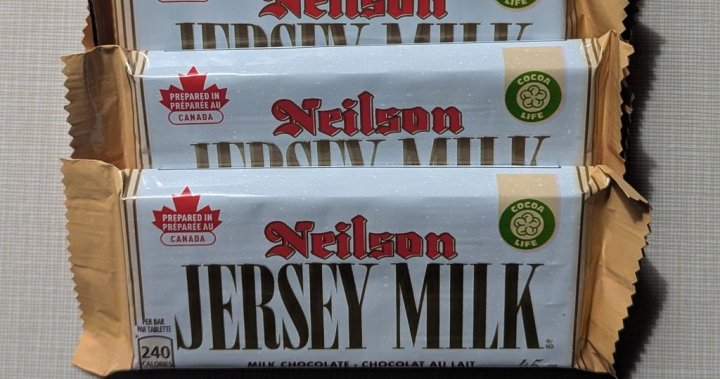The familiar purple wrapper that has comforted generations of Canadians is disappearing from store shelves. Hershey Canada has confirmed that Jersey Milk, the creamy chocolate bar that has been a staple in Canadian confectionery for nearly a century, is being discontinued. The news has triggered a wave of nostalgia and disappointment across the country, highlighting how deeply embedded certain brands become in our collective cultural identity.
“It was a difficult decision,” a Hershey spokesperson said in a statement that feels almost painfully corporate in its brevity. For many Canadians, however, this is more than just another product discontinuation—it’s the loss of a taste memory that spans generations.
Jersey Milk’s distinctive smoothness came from its recipe featuring milk from Jersey cows, known for producing milk with higher butterfat content. This wasn’t just marketing—the difference was palpable. The chocolate melted at just the right pace, with a creaminess that domestic competitors never quite managed to replicate. For decades, it occupied a unique position in Canada’s confectionery landscape: distinctly local yet universally appealing.
Social media has predictably erupted with lamentations. “First they came for Coffee Crisp, and I said nothing,” joked one Twitter user, referring to unfounded rumors about another Canadian chocolate bar’s demise that circulated last year. But beneath the humor lies a genuine sense of loss that speaks to something deeper about consumer culture.
What’s particularly fascinating about these reactions is how they reveal the emotional investment we make in consumer products. As I’ve noted in previous analyses of brand loyalty, these connections often transcend rational consumer behavior. Jersey Milk wasn’t just chocolate—it was childhood trips to the corner store, movie nights, and comfort during difficult times.
The discontinuation also reflects broader shifts in the confectionery industry. Multinational corporations like Hershey are continuously reevaluating their product portfolios, often at the expense of regional favorites that don’t generate sufficient global revenue. The economics makes sense on spreadsheets but fails to account for cultural significance.
This pattern isn’t unique to chocolate. Across the cultural landscape, we’re witnessing a homogenization of consumer experiences as global brands optimize for scale rather than local connection. The result is an increasingly uniform marketplace where products with deep regional roots struggle to justify their existence to distant corporate decision-makers.
What makes the loss of Jersey Milk particularly poignant is that it represents a uniquely Canadian experience. In a country often struggling to define its cultural identity distinct from American influence, these small touchpoints of shared experience matter. They’re part of our cultural vocabulary, references that need no explanation between Halifax and Vancouver.
The silver lining, if there is one, might be found in the growing artisanal chocolate movement across Canada. Small-batch producers from British Columbia to Nova Scotia are creating exceptional chocolates that celebrate local ingredients and craftsmanship. While they can’t replace the specific nostalgia of Jersey Milk, they perhaps offer something more valuable: a future where Canadian chocolate isn’t defined by multinational corporations but by local artisans connected to their communities.
For those seeking their final Jersey Milk fix, time is running out. Remaining inventory is expected to sell quickly as nostalgic consumers stock up. There’s already evidence of hoarding, with some stores limiting purchases and online resellers listing bars at inflated prices—a phenomenon that speaks to both consumer loyalty and the peculiar economics of scarcity.
As we bid farewell to this purple-wrapped piece of Canadiana, perhaps it’s worth reflecting on what these small cultural losses mean in aggregate. In an era of rapid change, these constant small eliminations of shared experiences chip away at our collective memory. Each discontinued product, shuttered local business, or forgotten tradition represents a tiny tear in our cultural fabric.
What chocolate bar will comfort the next generation of Canadians during late-night study sessions or bad breakups? Whatever it is, it likely won’t be made specifically for us. And that’s a loss worth acknowledging, even if it’s “just chocolate.” After all, in the tapestry of cultural identity, sometimes the smallest threads are what truly hold it together.
The next time you find yourself nostalgic for a discontinued treat, remember: it’s not just about the sugar. It’s about who we were when we enjoyed it, and what part of ourselves disappears when it’s gone.










